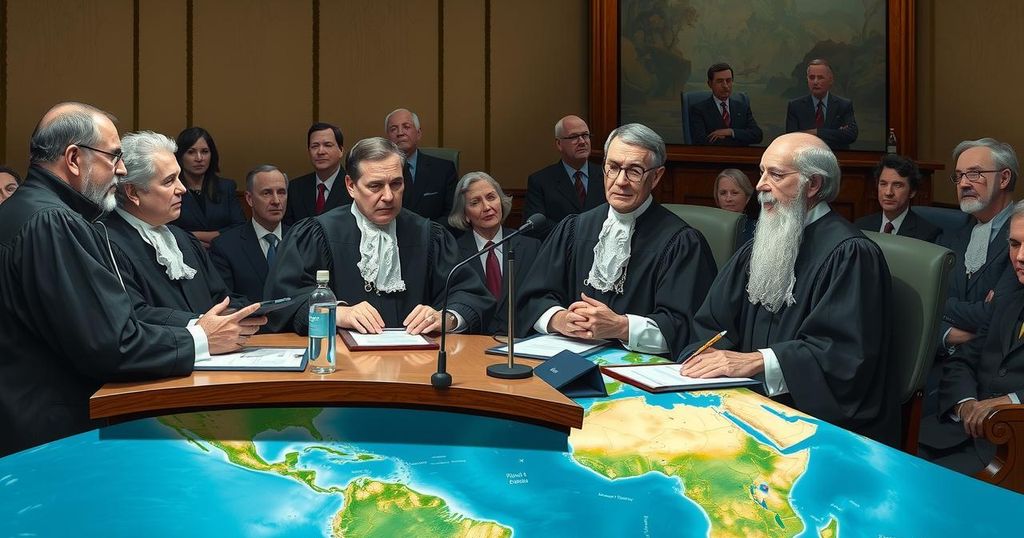The International Court of Justice held hearings in December regarding its Advisory Opinion on State obligations related to climate change, following a UN request. The court seeks to determine financial responsibilities and actions required to mitigate climate change. Four judges posed questions to participants, with responses due by December 20. The ruling could influence international law and reparations for climate change impacts on vulnerable nations, expected around mid to late 2025.
In early December, the International Court of Justice (ICJ) conducted oral hearings regarding its Advisory Opinion on the Obligations of States concerning Climate Change. This initiative, requested by the United Nations General Assembly, seeks to ascertain the financial responsibilities of nations toward climate change and the requisite actions to mitigate its impact. Following the hearings, four judges presented written inquiries to the involved parties, with responses due by December 20.
Established in 1945 through the UN Charter, the ICJ serves to resolve legal disputes among nations, functioning as a neutral judicial body based in the Peace Palace in The Hague, Netherlands. The ICJ comprises 15 judges, elected by the UN assembly and council, serving staggered nine-year terms. The current President, Judge Nawaf Salam of Lebanon, presides over the court, which also includes judges from countries such as Australia, Brazil, China, and the United States.
In response to a request by Vanuatu, the UN General Assembly is seeking clarity on the legal obligations states have to safeguard the climate system from human-induced greenhouse gas emissions. The questions posed include the obligations under international law for both current and future generations and the legal implications for states whose actions have caused significant harm to the environment.
The hearings commenced on December 2, with contributions from over 100 parties during a series of oral statements that continued until December 13. The legal discourse ranged from interpretations of the United Nations Framework Convention on Climate Change (UNFCCC) to the Paris Agreement. Larger nations contended that existing treaties take precedence over other international laws relating to climate change, effectively creating a framework that limits further legal duties. Conversely, developing nations asserted that climate change infringes upon human rights and proposed reparations for nations adversely affected by climate change impacts.
The ICJ follows a distinct procedural style; judges reserve their questions until the end of hearings, submitting written inquiries to participants thereafter. The four judges who submitted queries included Judge Sarah Cleveland from the United States, Judge Dire Tladi from South Africa, Judge Bogdan-Lucian Auresco from Romania, and Judge Hilary Charlesworth from Australia. Their questions explored obligations regarding fossil fuel production, the legal status of a healthy environment, and the implications of state declarations upon ratifying international agreements.
Although no specific timeline has been established for delivering the ICJ’s final opinion, complex legal analyses may result in a report being published around mid to late 2025.
The International Court of Justice (ICJ) is tasked with the clarification of international legal obligations regarding climate change at the request of the United Nations General Assembly. This advisory opinion will outline the financial liabilities of states concerning emissions and climate protection measures. It serves as a significant moment in global discussions about accountability for climate change, an issue impacting countless nations and future generations. The outcome may influence international law and countries’ actions related to environmental protection and human rights.
In conclusion, the ICJ’s advisory opinion on climate change presents a pivotal opportunity to clarify states’ obligations under international law. As nations grapple with the increasing impacts of climate change, the ICJ’s ruling could guide future legal frameworks and reparations concerning environmental responsibility. The responses to the judges’ inquiries will further shape this historic legal discourse, emphasizing the urgency and importance of addressing climate change legally and ethically.
Original Source: www.forbes.com






